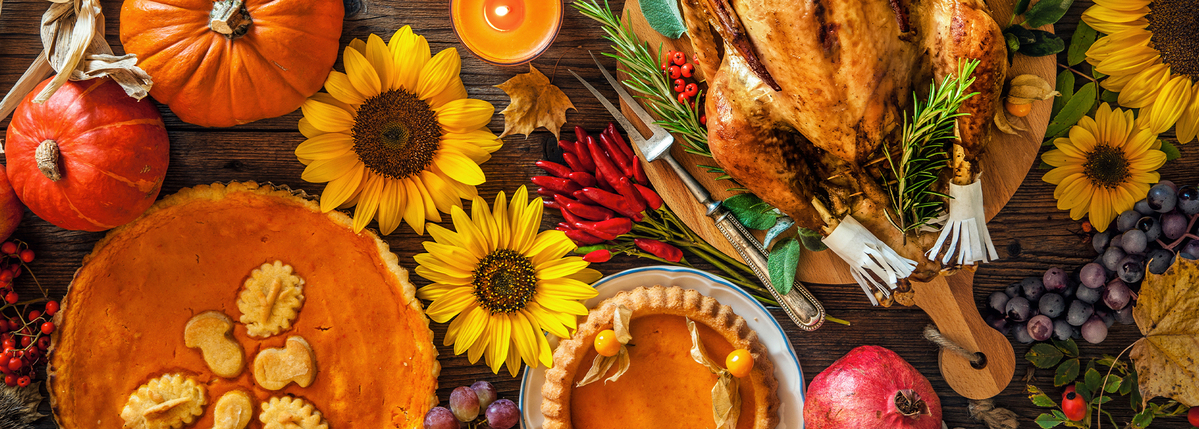Surviving the Holidays—Parenting Guide for T1D Kiddos
Written by: Beyond Type 1 Editorial Team
5 minute read
December 20, 2016
Note: This article is part of our library of resources for Celebrations & Holidays. Check out our food and drinking tips as well as an array of holiday carb charts here.
With the holiday season upon us, many parents to wonder and worry how they can possibly fit in all of the demands of a child’s diabetes management without losing any of the holiday spirit. Between changing schedules, classroom parties, family gatherings, mountains of sweet treats and special activities and outings, all the festivities and fun can throw a wrench into a carefully curated diabetes management plan! We hope you enjoy the holiday time with as much cheer and as little stress as possible. Our recipe for happy holidays (with a young child with type 1 diabetes) includes a bit of planning, a dash of flexibility and a sprinkle of consistent routines! Together, these tips can make the holidays more enjoyable for the entire family by minimizing and preventing challenges with your little one’s type 1 diabetes (T1D).
Maintain Routines
Part of the fun (and frustration!) of the holiday season includes parties (that end past bedtime), yummy (but carb-heavy) treats and special activities (with unpredictable physical activity levels or travel challenges)—while this can be the most wonderful time of the year, all of these unique events can easily throw off your schedule for managing diabetes. Even though it can be tricky, try to maintain your young child’s routines as much as possible. Having a predictable structure and knowing what to expect helps young children regulate their behavior, and can help make diabetes management go more smoothly. It can be difficult to keep this type of structure during the holidays, so think about which routines work best for your child, and do your best to stick to them.
- The first priority should be diabetes-care tasks. If your child’s diabetes isn’t cooperating, it will be much harder to enjoy the rest of the fun, so focus on blood glucose monitoring and management first.
- Keep bedtimes and mealtimes as close to normal as possible. For example, if a meal is going to be later than usual, arranging for your child to eat separately can help you stick to your usual insulin dosing and blood glucose monitoring schedule. If you’ll be away from home for a meal or late at night, sometimes it helps to talk to your host up front to make arrangements.
- Continue your usual bedtime rituals. After a long day full of exciting activities, this quiet time at the end of the day can be a good chance to make sure diabetes management has been taken care of, and calming activities before bedtime (e.g. reading, relaxing music, snuggling) can reduce the impact of holiday excitement on your child’s sleep and behavior. Even if sticking to bedtime routines means missing out on part of a late-night holiday tradition, keeping your child’s sleep routine intact and getting nighttime diabetes management done will help your child have the energy to participate fully in all the festivities the next day!
Plan Ahead
The one thing we can all predict about diabetes in a young child is that it is unpredictable, and no one wants to spend the holidays dealing with an unexpected diabetes crisis. So, this is an especially important time of year to use your organization skills to be prepared for whatever the holidays and diabetes throw your way!
- Bring a snack or eat at home before heading out for holiday events where you don’t know the timing of meals or what foods will be offered. Bring preferred foods with you to ensure you child gets enough carbs, but be flexible to swap out one of your foods for a something on the table if your child wants to participate in the holiday meal.
- Think ahead about how you might fit special foods into your management plan for the day. If your child is willing to try new foods, ask the host for information on what is in the recipes being served so that you can calculate insulin doses as accurately as possible. And you can always ask your diabetes care team for tips about how to dose for any special holiday treats.
- Let your child know what to expect ahead of time to prevent disappointment or upset. For example, if your child loves sweets, try: “There will be cookies at the party and we will only have one. You can pick the very best cookie and it will be so good!”
- Communication is key. Prepare your family and friends ahead of time so that they avoid making unwanted comments such as, “I don’t think he can eat that!” or “Poor baby, with all those painful needles and pokes! That must hurt!” Let them know how they can be helpful—maybe by singing a fun holiday song as a distraction while you do an injection or enjoying a low-carb snack with your child.
- If you’re traveling for the holidays, bring two to three times more supplies than you expect to use.
Have Fun!
Most importantly, remember to have fun and enjoy this time together as a family. By handling the challenges of diabetes in a matter-of-fact way and getting back to having fun, you can teach your child that it is possible to take good care of diabetes without missing out on the cheer! Don’t forget to pay attention to everything your child is doing well even in the midst of all the activities, and feel free to pile on the praise: “Thank you so much for eating this snack, now you are ready to go build that snow man!” or “I’m so proud of you for taking a break from playing with your cousins to let me do your insulin!”
This time of year is also an ideal opportunity to show your child that the holidays are about giving and caring for others, so pick a diabetes-related group together and find a way to give back to the community. While you’re getting connected to diabetes groups, take advantage of the wisdom of other parents of young children with T1D to explore ideas of what has worked well for them to fit diabetes management into a busy, fun-filled, holiday season. Finally, don’t forget to take a few moments to relax and enjoy the season—refreshing yourself will make sure you’re at your best for your child—you’ll need it!
Happy Holidays!
This work is funded by NIH DP3DK103998 and R01DK102561
 Marisa E. Hilliard, PhD, is a pediatric psychologist and behavioral scientist whose work focuses on clinical care and research with young people with type 1 diabetes and their families. Her passion is promoting resilience, and her research focuses on how youth and families overcome the challenges of diabetes to maintain good quality of life, adhere to treatment recommendations and have optimal diabetes control. She is especially interested in transitional times in diabetes management, such as adjusting to life with a new diabetes diagnosis, how family diabetes management shifts across childhood and adolescence and how teenagers prepare to manage their diabetes as young adults. Dr. Hilliard is an assistant professor of Pediatrics at Baylor College of Medicine, in the Psychology Section of Texas Children‘s Hospital in Houston, Texas.
Marisa E. Hilliard, PhD, is a pediatric psychologist and behavioral scientist whose work focuses on clinical care and research with young people with type 1 diabetes and their families. Her passion is promoting resilience, and her research focuses on how youth and families overcome the challenges of diabetes to maintain good quality of life, adhere to treatment recommendations and have optimal diabetes control. She is especially interested in transitional times in diabetes management, such as adjusting to life with a new diabetes diagnosis, how family diabetes management shifts across childhood and adolescence and how teenagers prepare to manage their diabetes as young adults. Dr. Hilliard is an assistant professor of Pediatrics at Baylor College of Medicine, in the Psychology Section of Texas Children‘s Hospital in Houston, Texas.

Wendy Levy, LCSW, is a clinical social worker with over a decade of experience working with young people with type 1 diabetes and their families. She is a project manager for several research studies in the Pediatric Psychology Section of Baylor College of Medicine at Texas Children’s Hospital. Wendy has done both clinical work and research studies focused on the parent child relationship, improving quality of life, preventing burnout and adjustment to a new diabetes diagnosis. Her passion is to enhance the family’s ability to work together in order to overcome any challenges of living with diabetes and optimize diabetes control.
 Meredith H. Rose, LSW, is a licensed social worker who completed her masters in social work and law from The University of Pennsylvania in 2016. She currently serves as a clinical research interventionist with Drs. Randi Streisand and Maureen Monaghan at Children’s National Medical Center. Meredith is working on two NIH funded trials to promote diabetes management in families of young children with type 1 diabetes and also an NIH funded pilot looking at the transition of young adults to adult healthcare providers. Her interests include behavior change, eating patterns, promoting physical activity and parent-child resiliency. Meredith’s past research concentrated on sleep, nutrition and physical activity patterns in adolescents, eating disorders in children and adolescents and feasibility of wellness programs in emergency housing.
Meredith H. Rose, LSW, is a licensed social worker who completed her masters in social work and law from The University of Pennsylvania in 2016. She currently serves as a clinical research interventionist with Drs. Randi Streisand and Maureen Monaghan at Children’s National Medical Center. Meredith is working on two NIH funded trials to promote diabetes management in families of young children with type 1 diabetes and also an NIH funded pilot looking at the transition of young adults to adult healthcare providers. Her interests include behavior change, eating patterns, promoting physical activity and parent-child resiliency. Meredith’s past research concentrated on sleep, nutrition and physical activity patterns in adolescents, eating disorders in children and adolescents and feasibility of wellness programs in emergency housing.

Author
Beyond Type 1 Editorial Team
Beyond Type 1 is the largest diabetes org online, funding advocacy, education and cure research. Find industry news, inspirational stories and practical help. Join the 1M+ strong community and discover what it means to #LiveBeyond a diabetes diagnosis.
Related Resources

With the festive season already here, you might feel a mix of excitement and overwhelm...
Read more

It's pumpkin spice season! Or fall, depending on what you like to celebrate. Whether it's...
Read more

Note: This article is part of our library of resources for Celebrations & Holidays. Check out...
Read more

